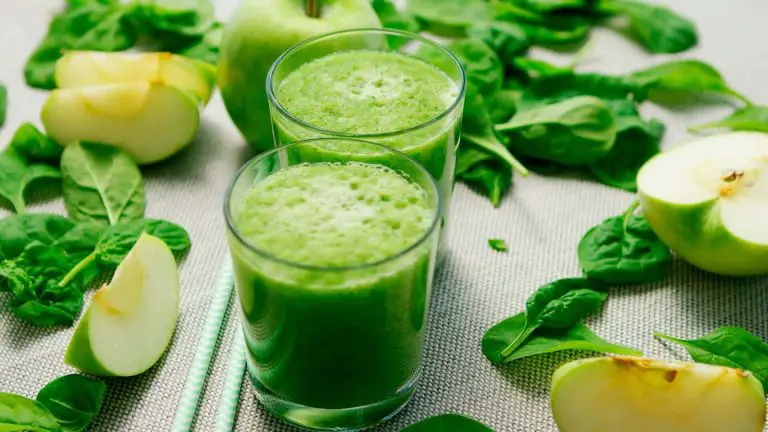7 Benefits Of Mushroom Compost: All The Important Info!
Are you feeling a bit confused about the benefits of mushroom compost?
It’s ok, you’re not alone!
When I first heard of mushroom compost I thought it was some kind of pulverized mushroom blend that you mix through your garden soil.
While that could be moderately beneficial for your garden, it would also be quite expensive. Thankfully true mushroom compost is a very affordable and highly beneficial addition to your garden.
So what even is it?
The contents of mushroom compost vary greatly but are usually made from a mix of materials like peat moss, chicken manure, rye straw, lime, and gypsum.
Mushroom compost is initially made for growing mushrooms. However, once it has grown a batch of mushrooms it still has plenty of nutrients and beneficial properties left to enhance your garden.
In this guide, we will explain the benefits of mushroom compost and how to use it. More importantly, we’ll tell you when you should NOT use it.
7 Benefits Of Mushroom Compost
- 1. Mushroom Compost Improves Soil Structure
- 2. Mushroom Compost Has A Mild Nitrogen Content
- 3. Mushroom Compost Improves Soil Water Retention
- 4. Mushroom Compost Is High In Calcium
- 5. Mushroom Compost Attracts Earthworms
- 6. Mushroom Compost Is An Eco-Friendly Option
- 7. Mushroom Compost Is A Great Slow-Release Fertilizer
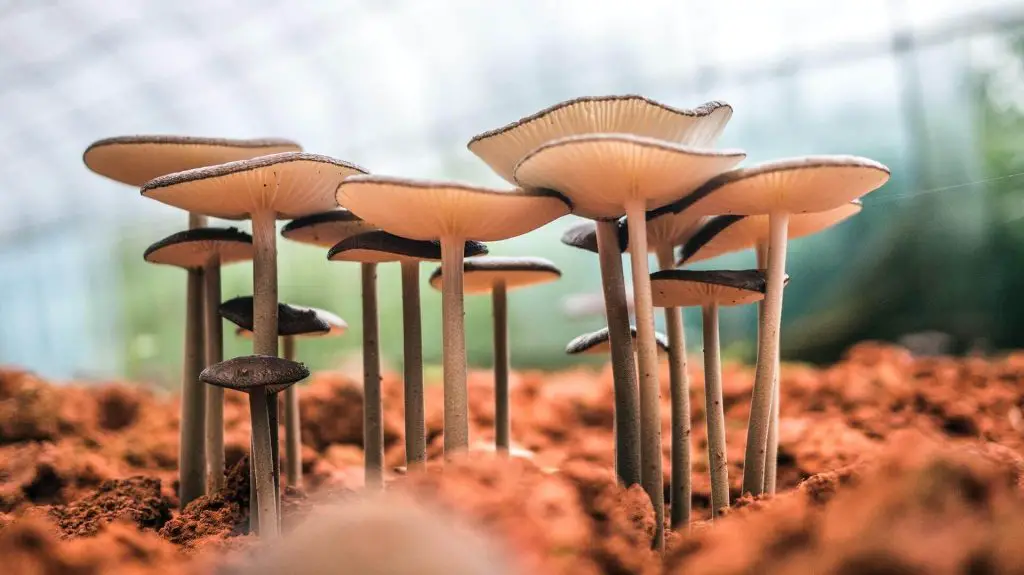
Affiliate Disclaimer
Some of the links in this article are affiliate links and I may earn if you click on them, AT NO EXTRA cost to you. I hope you find the information here useful!
Related Posts:
- Does A Compost Bin Smell? And How To Get Rid Of It
- Permaculture Gardening for Beginners – How to Get Started
- How To Sterilize Soil In Many Different Ways!
- Is Organic Compost A Fertilizer? + How To Use It Properly
- How To Make Coco Peat: 7 Step Guide [2022]
7 Benefits of Mushroom Compost
Mushroom compost is an inexpensive way to improve your garden soil. It is suitable for most garden plants and releases a constant low dose of nitrogen for healthy growth.
Your watering schedule is decreased by the water-holding capacity of mushroom compost and it’s great for fixing clay soils.
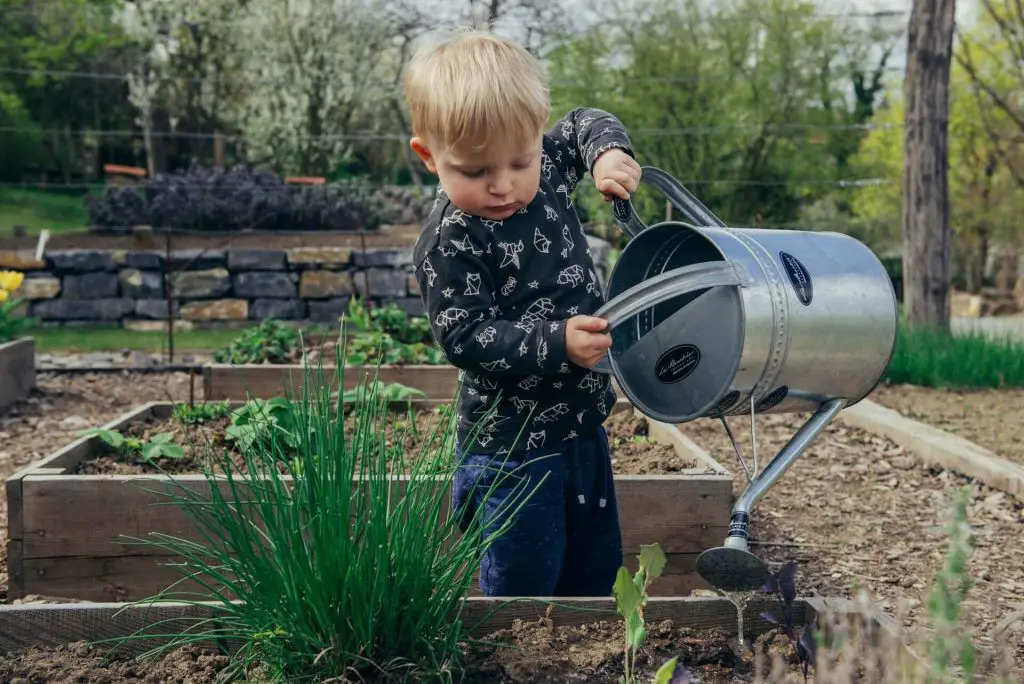
1. Mushroom Compost Improves Soil Structure
Soil can become dense over time which doesn’t make plants very happy.
Thankfully mushroom compost can help as it commonly has a straw base. When this is added to heavy clay soil it helps to break up the dense soil and lighten its structure.
This is important because heavy soil can quickly become water-logged. Plants sitting in waterlogged soil will usually suffer from root rot and eventually die.
Loosening dense soil by adding mushroom compost improves the drainage capacity of the soil. So goodbye root rot and hello happy, healthy, thriving plants!
2. Mushroom Compost Has A Mild Nitrogen Content
The mild nitrogen content is one of many mushroom compost benefits.
A slow consistent release of nitrogen is awesome for the long-term health of your plants!
High nitrogen fertilizers can burn plants, encourage weeds to grow, and cause a lot of unnecessary leafy growth rather than growing flowers and fruits.
In contrast, the mild nitrogen content of mushroom compost gives your plants a slow uptake of nutrients. This is much better for sustainable, consistent, long-term growth and healthy, happy plants.
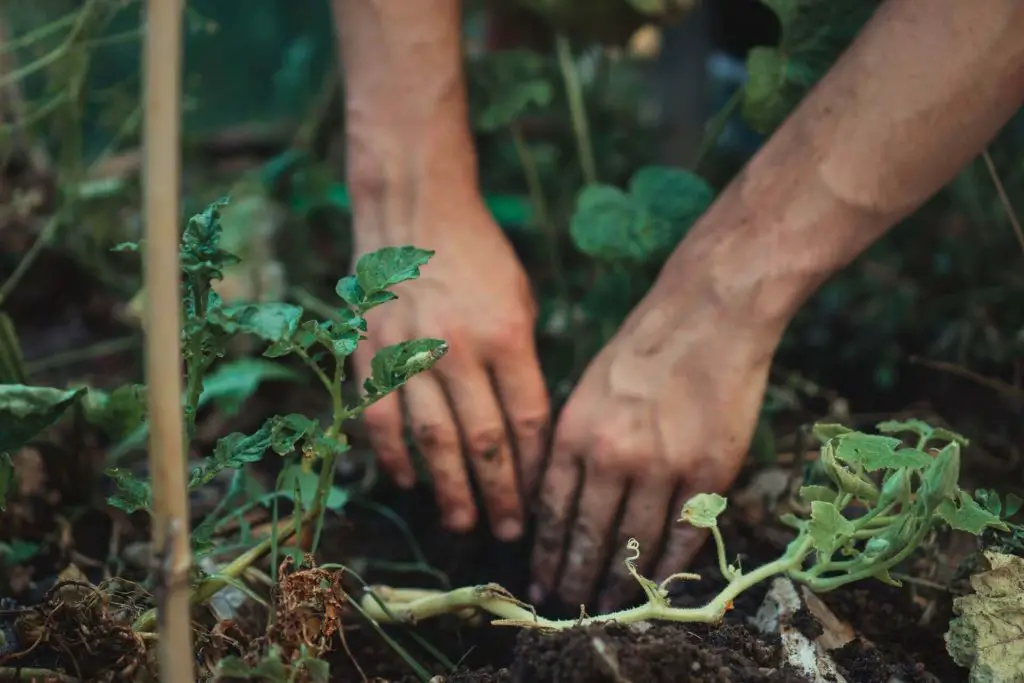
3. Mushroom Compost Improves Soil Water Retention
Mushroom compost is much better at retaining water than regular compost.
This particular quality can save you both time and money. Introducing mushroom compost to your garden in the right ratio can reduce your water requirements by up to half!
Mushroom compost’s superior water retention capacity can also reduce how often you have to water your plants.
It’s a great soil addition for plants like ferns who like moist conditions and usually require constant watering.
4. Mushroom Compost Is High In Calcium
Many fruit and vegetables like Apples, citrus fruits, melons, and tomatoes require a high level of calcium to thrive.
The good news is that mushroom compost is high in calcium!
Calcium is important for strong cell walls in your plants and also for transporting other important nutrients.
A good example of plants that need calcium is tomatoes.
It’s common for tomato plants that aren’t getting enough calcium to develop blossom end rot. This looks particularly nasty and can drastically reduce your tomato crop.
5. Mushroom Compost Attracts Earthworms
Beneficial earthworms really love damp soil!
Adding mushroom compost to your garden provides the perfect conditions for them to burrow in and do their best work.
You’ll want lots of earthworms in your garden for many reasons. They are fabulous at aerating your soil to prevent it from becoming dense and clay-like.
Earthworms are also great decomposers of organic matter. Having plenty of them in your garden will ensure lots of beneficial nutrients for your plants to thrive!
6. Mushroom Compost Is An Eco-Friendly Option
Mushroom compost is originally used to grow mushrooms on and then discarded.
By using this discarded material in your garden you are helping to create a sustainable lifecycle.
This is a two-fold benefit as you are using a waste product and also replenishing your soil with compost that required no new matter to produce.
Due to the high water retention properties of mushroom compost, you’ll also be conserving water by using it in your garden.
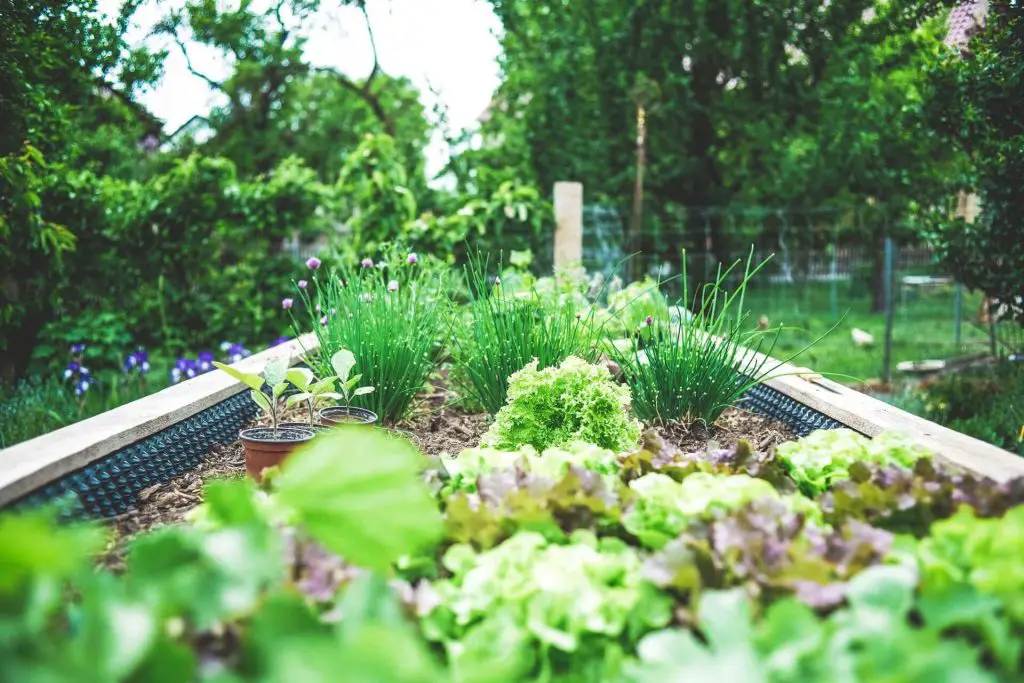
7. Mushroom Compost Is A Great Slow-Release Fertilizer
Compost in general is a great slow-release fertilizer. As it slowly degrades it continues to release a large variety of nutrients to your plants over time.
This is a common quality of all composts and mushroom compost is no different.
Like other composts, mushroom compost is a great source of potassium, nitrogen, and phosphorus.
It usually contains slightly less of these nutrients than cow manure, but comes ready to use straight in your garden. Whereas cow manure requires preparation before you can add it to your soil.
How To Use Mushroom Compost
There are many mushroom compost uses that your garden will benefit from.
Here are a few of the most popular ones:
1. Benefits Of Mushroom Compost For Houseplants
Mushroom compost can be used in small amounts for potted house plants.
Most house plants originated from tropical or subtropical regions and like a lot of moisture in their soil. The water-retaining properties of mushroom compost make an ideal soil amendment for keeping the soil damp.
A little bit of mushroom compost can go a long way and will noticeably reduce your plant’s watering requirements. So less work for you!
The slow release of nitrogen and other nutrients will also keep your houseplants happy and healthy with minimal effort.
How To Use: Mushroom compost needs to be mixed with soil before using in your house plant pots. A ratio of 1 part mushroom compost to 3 parts potting mix is ideal for most house plants. Make sure you also use a pot with sufficient drainage so your plants don’t end up waterlogged and suffering from root rot.
This is my favorite website for healthy, low-maintenance houseplants.
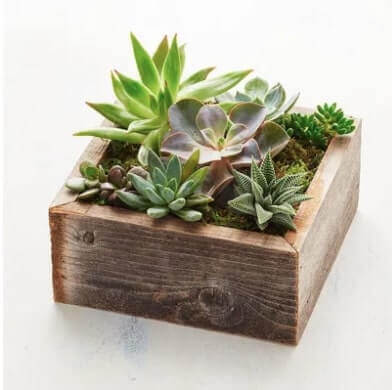
2. Benefits Of Mushroom Compost For Vegetable Gardens
Mushroom compost is a great addition to your vegetable garden!
Like other types of compost, it is a superior slow-release fertilizer. Plants receive a consistent drip feed of nutrients which creates healthy sustainable growth.
Naturally occurring slow-release fertilizers are superior to synthetic high doses of nitrogen in many situations.
High nitrogen fertilizers tend to encourage a lot of unnecessary leafy growth on your vegetable plants and stimulate weeds to grow. Whereas slow-release fertilizers like mushroom compost help plants to produce healthy, tasty, edible vegetables.
Mushroom compost also helps your vegetable garden to retain moisture. This is a great water saver during the hotter summer months. It also reduces your work since you have to water your garden less frequently!
How To Use: Most gardeners find a ratio of anywhere from 25:75 to 50:50 of mushroom compost to garden soil works well. Clay soils will benefit from around 50% mushroom compost whereas healthy soils will need less.
3. Benefits Of Mushroom Compost As A Mulch
Mushroom compost is an excellent mulch material! A few inches added to the top of your soil provides a nice layer of insulation.
It also retains water really well to keep your topsoil consistently moist and boosts the quality of your soil as it slowly breaks down.
How To Use: Spread anything from 1-3 inches of mushroom compost on top of garden beds leaving a small donut hole around individual plants.
Three inches is ideal for suppressing weeds and retaining moisture in your soil. For young plants and seedlings, it’s best to mix with garden soil first to prevent burning sensitive plants.
4. Benefits Of Mushroom Compost For A Healthy Lawn
Another excellent use for mushroom compost is for lawn care.
Both new and established lawns benefit from the nitrogen content and water retention properties of mushroom compost.
Grass is not easily burned by nitrogen and the nutrient concentrations in mushroom compost are great for healthy lawn growth.
You can spread mushroom compost directly on grass and use a rake to spread it across your lawn. Although best practice is usually to mix the compost with garden soil prior to spreading it over your lawn.
While grass isn’t particularly sensitive to salts, salts can accumulate to high levels over time if your soil isn’t draining well. So you should dilute mushroom compost with soil before applying it just to be safe.
How To Use: For new lawns mix 2 inches of mushroom compost into the top 5 inches of soil before spreading your grass seed. For established lawns sprinkling over a mix of 50:50 mushroom compost and garden soil is ideal to give them a boost.
5. Benefits Of Mushroom Compost For Flowerbeds
Mushroom compost can be used as both a soil amendment and a mulch for flowerbeds.
Its water retaining properties will make your life easier and your flowers much happier!
The slow continuous release of nitrogen, potassium, and phosphorus will encourage sustainable growth. This is important for the long-term health of your flower beds.
Just remember not to use mushroom compost for any flowers that are sensitive to salt!
How To Use: Before adding plants, till around 3 inches of mushroom compost into the top six inches of your flower bed. Once plants are established add another 1-3 inches of mushroom compost as a mulch.
These beautiful planter boxes are perfect for growing a colorful flower garden on your patio or balcony.
How To Make Mushroom Compost
Making mushroom compost takes around 5-6 weeks and is relatively simple.
You will need a 5 feet by 5 feet pile of organic matter that is at least 4 feet high. This can be a combination of hay, straw, horse bedding, corn cobs, and husks.
You will also need around half this amount of poultry or horse manure and 20 cups of gypsum.
A compost thermometer with a long stem is also essential.
- First, wet the pile of organic matter thoroughly and let it sit for 24-48hrs.
- Next mix in the manure and gypsum, wet the pile again, and cover in black plastic sheeting.
- Leave the pile for around two weeks until the temperature of the pile reaches 140-160 degrees Fahrenheit (60-70 degrees celsius).
- When your pile is hot enough start to turn it inwards every 2-3 days and wet it thoroughly each time.
- After 2-3 weeks of turning your pile should now be dark brown and most of the organic matter well broken down.
- Uncover your pile of compost and let it cool down for at least a week before using it in your garden.
Where To Source Mushroom Compost
It’s worth checking if there is a commercial mushroom grower near you. As mushroom compost is a waste product for them they will usually sell it to you at a bargain price or even give it away for free.
Local farmers or hobby mushroom growers are also useful sources for smaller amounts of mushroom compost.
Facebook marketplace and Craigslist are great places to look for free or very cheap mushroom compost. Joining your local community’s Facebook group or page is also helpful for making contacts to source your mushroom compost.
If you are unable to access mushroom compost near where you live, you can easily order some online.
When NOT To Use Mushroom Compost
So what is mushroom compost not good for?
You should not use mushroom compost in areas where you are planning to plant anything that is salt sensitive. Rhododendrons, camellias, and azaleas are some common plants that cannot tolerate salt.
The high levels of salt can also harm young seedlings and damage germinating seeds. For this reason, it is unwise to sow seeds directly into soil that has been amended with mushroom compost.
When using mushroom compost on new garden beds it is best to mix it into the soil first and transplant established seedlings.
Mushroom Compost vs Cow Manure
Both mushroom compost and cow manure are highly beneficial additions to your garden. They are both fairly inexpensive also.
However, mushroom compost wins this round because it is easier to use. Not to mention it’s much less smelly!
For most applications, cow manure needs to be prepared in some way before adding it to your garden bed. Generally, this means either composting the cow manure over time or making it into a tea.
Mushroom compost requires very little preparation and can be used immediately. All you need to do is mix it with some soil, spread it as a mulch, or till it directly into your garden bed.
An additional benefit of mushroom compost is that it’s already been pasteurized before you receive it. This removes the risk of any harmful pathogens growing in your soil which can occasionally occur with cow manure compost.
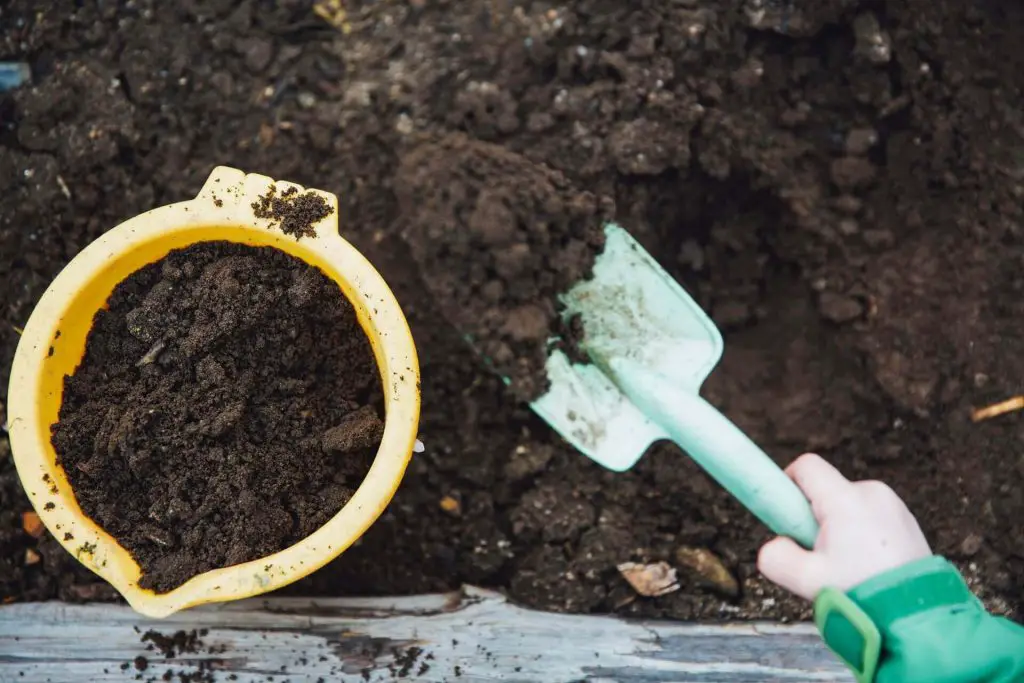
FAQs
Is Mushroom Compost Better Than Regular Compost?
So, is mushroom compost better than regular compost? Mushroom compost is not better than regular compost. Regular compost will work well for all plants. Whereas mushroom compost will have additional benefits for some plants but very negative effects for others. Regular compost will be easier for beginner gardeners, but mushroom compost is usually much cheaper.
Is Mushroom Compost Good For All Plants?
If you’re wondering is mushroom compost good for all plants – Mushroom compost is not good for all plants. It is high in soluble salts and other nutrients that can kill germinating seeds. It can also harm plants like azaleas, camellias, and rhododendrons that are very sensitive to salts.
Can You Use Too Much Mushroom Compost?
Can you use too much mushroom compost? It is possible to use too much mushroom compost. The high concentration of soluble salts can burn young or sensitive plants if you use too much. It is best to mix mushroom compost with garden soil first and use the correct ratio for the type of plants you are growing.
Is Mushroom Compost Good For Tomatoes?
Is mushroom compost good for tomatoes? Mushroom compost is great for tomatoes. The high amount of calcium in mushroom compost benefits tomato plants. Calcium-deficient soil is usually the cause behind blossom end rot on tomatoes. Mushroom compost is a great soil addition to counteract this.
These adjustable tomato cages make growing healthy tomato plants super easy!
I love growing heirloom varieties for super tasty and colorful tomatoes.
When Should You Not Use Mushroom Compost?
So, when should you not use mushroom compost? You should not use mushroom compost for most young plants, germinating seedlings, or salt-sensitive plants like camellias, azaleas, and rhododendrons. The ph of mushroom compost is very alkaline and high soluble salt levels can damage some plants. It can be a very beneficial soil amendment but only when used correctly.
Do You Need To Dig In Mushroom Compost?
Wondering if you need to dig in mushroom compost? You need to dig in mushroom compost or pre-mix it with garden soil. It is not suitable to use as a direct soil replacement. When used undiluted mushroom compost can become waterlogged causing root rot or fungal infections. The high salt content can also be damaging for many plants when used undiluted.
Is Mushroom Compost A Fertilizer?
Is mushroom compost a fertlizer? Mushroom compost is a naturally occurring slow-release fertilizer. It is comprised of organic materials like hay, straw, poultry or horse manure, and corn hulls. Mushroom compost provides low levels of nitrogen and other nutrients over time as it slowly breaks down in your soil.
Is Mushroom Compost Good For Flower Beds?
Is mushroom compost good for flower beds? Mushroom compost is a great soil addition for flower beds. You can use mushroom compost for garden health as a mulch or soil conditioner. It is beneficial for most flowering plants, except salt-sensitive plants like rhododendrons, azaleas, and camellias.
Growing beautiful flower gardens is easy in these galvanized raised garden beds!
Will Mushroom Compost Burn Plants?
So, will mushroom compost burn plants? Mushroom compost can burn plants if it is misused. The high salt concentration and nitrogen content can burn young plants and kill germinating seeds. To prevent any damage, mix mushroom compost with garden soil before adding it to garden beds and avoid using it on salt-sensitive plants.
Is Mushroom Compost Good For Strawberries?
Is mushroom compost good for strawberries? Mushroom compost is an excellent soil addition when growing strawberries. Strawberry plants require a lot of water to produce quality fruit and mushroom compost is helpful for keeping the soil moist. Mushroom compost also contains high levels of nitrogen, potassium, and phosphorus which are important for healthy fruit.
Growing your strawberry plants in a strawberry tower makes growing super easy and gives strawberries plenty of space to ripen evenly.
Final Thoughts
By now you’re probably feeling excited about adding some mushroom compost to your next garden bed!
The benefits of mushroom compost are extensive and quite unique. Use it wisely and you’ll have no regrets.
It’s good to plan which plants you want to grow before adding mushroom compost to your garden bed. Make sure the plants you chose can tolerate a high salt content and high level of moisture in the soil.
Now that you understand mushroom compost advantages and disadvantages you are well equipped to enjoy the benefits of mushroom compost in your garden.
Learn to use it well so you will be rewarded with healthy soil and thriving plants!
Related Posts:







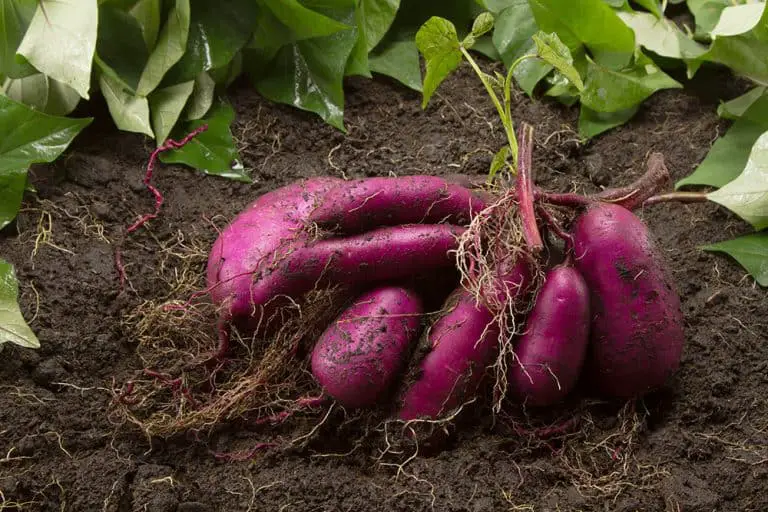
![How To Harvest Rosemary Without Killing The Plant? [Personal Experience!]](https://aboveandbeyondgardening.com/wp-content/uploads/2022/10/How-To-Harvest-Rosemary-Without-Killing-The-Plant-3-768x511.jpg)
![8 Pumpkin Growing Stages [+ Growth Tips!]](https://aboveandbeyondgardening.com/wp-content/uploads/2022/10/Pumpkin-Growing-Stages-9-768x512.jpg)
![How To Propagate Orchids [ An Easy 2022 Guide]](https://aboveandbeyondgardening.com/wp-content/uploads/2021/10/How-To-Propagate-Orchids-768x512.jpg)
![How To Harvest Kale Without Killing The Plant [What to Avoid!] 2023](https://aboveandbeyondgardening.com/wp-content/uploads/2022/10/how-to-harvest-kale-without-killing-the-plant-1-768x512.jpg)
